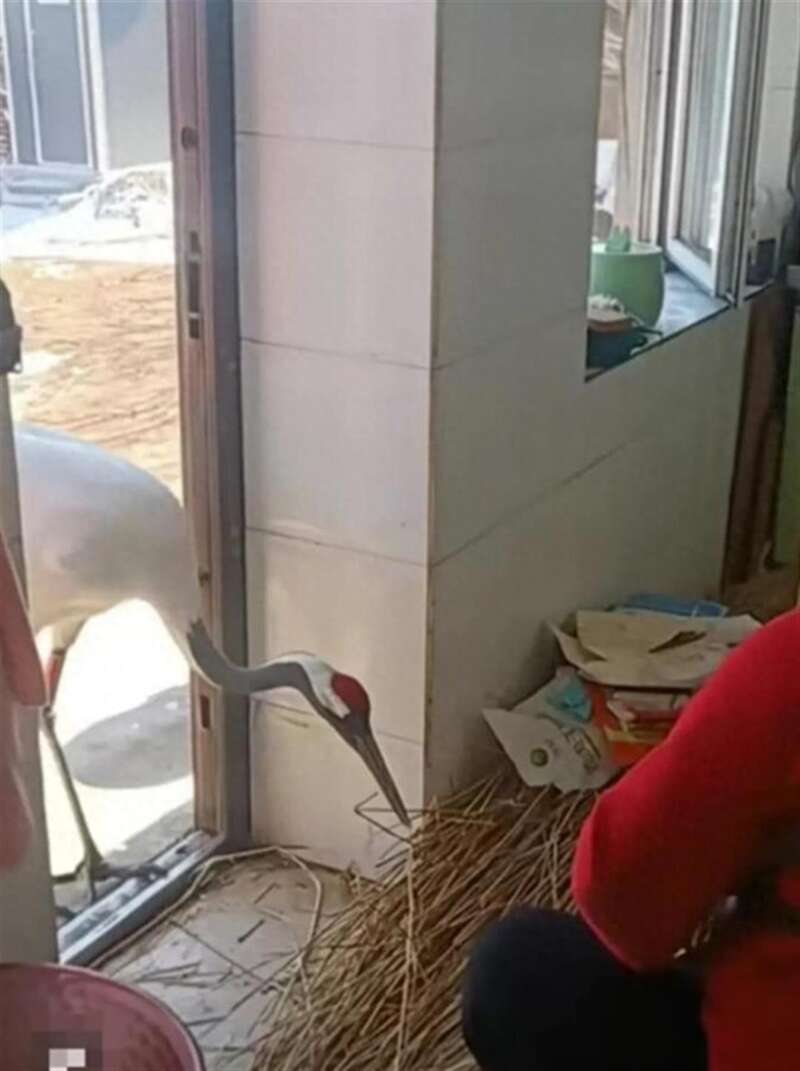A-
A
A+
There are more and more wild animals. Red-crowned cranes break into villagers’ homes to “beg for fish.”
Source: backchina.com
On November 25, some netizens posted a video saying that in Qiqihar, Heilongjiang Province, a red-crowned crane walked into a resident’s home “begging for fish.” On the 26th, staff from the Zhalong Nature Reserve Management Bureau in Heilongjiang Province responded that it was not yet certain whether the crane was a wild one. If residents encountered a wild crane, they were advised not to approach or feed it. (According to Jimu News report on November 26)
Relevant video screenshots show that a red-crowned crane broke into a villager’s home, and the villager was preparing to “cook fish” at home. After being blocked by villagers, the red-crowned crane exited the house. The video sparked attention and discussion online.
In the 2020 version of the “Red List of Vertebrate Animals in China”, the red-crowned crane is listed as endangered. In 2021, it was included in China’s “List of National Key Protected Wild Animals”, and the red-crowned crane is a national first-level protected wild animal. In other words, its protection level is the same as that of giant pandas.
Red-crowned cranes are what the people call “cranes”, and ordinary people know that they should not be harmed. However, a red-crowned crane arrived at the doorstep of the house, and whether it was “begging for a fish” or not was aroused heated discussion among netizens. Some netizens said that everyone who comes is a guest, not to mention a “lucky bird”, and they should be “entertained” as a landlord. Some netizens said that they could not be fed and the villagers did the right thing.
Undoubtedly, the official statement is more authoritative, which is two principles: do not approach and do not feed. Generally speaking, these are also two basic norms for people to get along with wild animals. Keep a distance to prevent both parties from being harmed and to avoid infectious germs; by not feeding them, you are actually protecting them in disguise.
Experts said that the natural ecosystem is a complex food chain. Animals grow old, sick and die, and the survival of the fittest is a natural law. Human food is not suitable for the gastrointestinal systems of wild animals, and the act of feeding food will reduce the predatory ability of wild animals. In addition, when wild animals become dependent on feeding food, they will lower their vigilance towards humans and become easily hunted by criminals. In short, it does more harm than good.
Of course, in some emergencies or extreme weather, in order to ensure their survival, the relevant departments temporarily and scientifically feed some food to tide over the difficulties, that is another matter. Alternatively, it may be necessary for relevant departments to take temporary rescue measures for some endangered species.
At present, wild animals appear more and more in our lives, not only in the countryside, but also in more and more urban communities, such as squirrels, badgers, weasels, etc. On the one hand, it shows that my country’s environmental protection has made great progress in recent years. On the other hand, living in harmony with them becomes a subject. There are two extreme behaviors to avoid here. First, some residents have adopted a boycott attitude, fearing that they will hurt people, and have taken measures to kill them; second, some people have adopted the same approach to pets by feeding them, thinking it is for their own good.
In fact, both of these mentality are unnecessary. Generally speaking, wild animals will not take the initiative to harm people, and will even take the initiative to avoid people when encountering them. However, we should be reminded that some wild animals have the behavior of protecting their cubs during their nurturing period, and may actively hurt people after being attacked.
In short, when it is impossible to confirm whether the red-crowned crane is wild or raised in a protected area, it is the right thing to do not “satisfy” the requirements for the red-crowned crane that comes to “beg for fish”. This is not stingy, let alone cold-blooded and indifferent, but a way of getting along between humans and wild animals.
Everyone should respect nature and wild animals, and adopt the principles of not being afraid, not touching, not feeding, and not harming them. If you do encounter danger, you can take emergency measures to save yourself and call the police for help in time.


